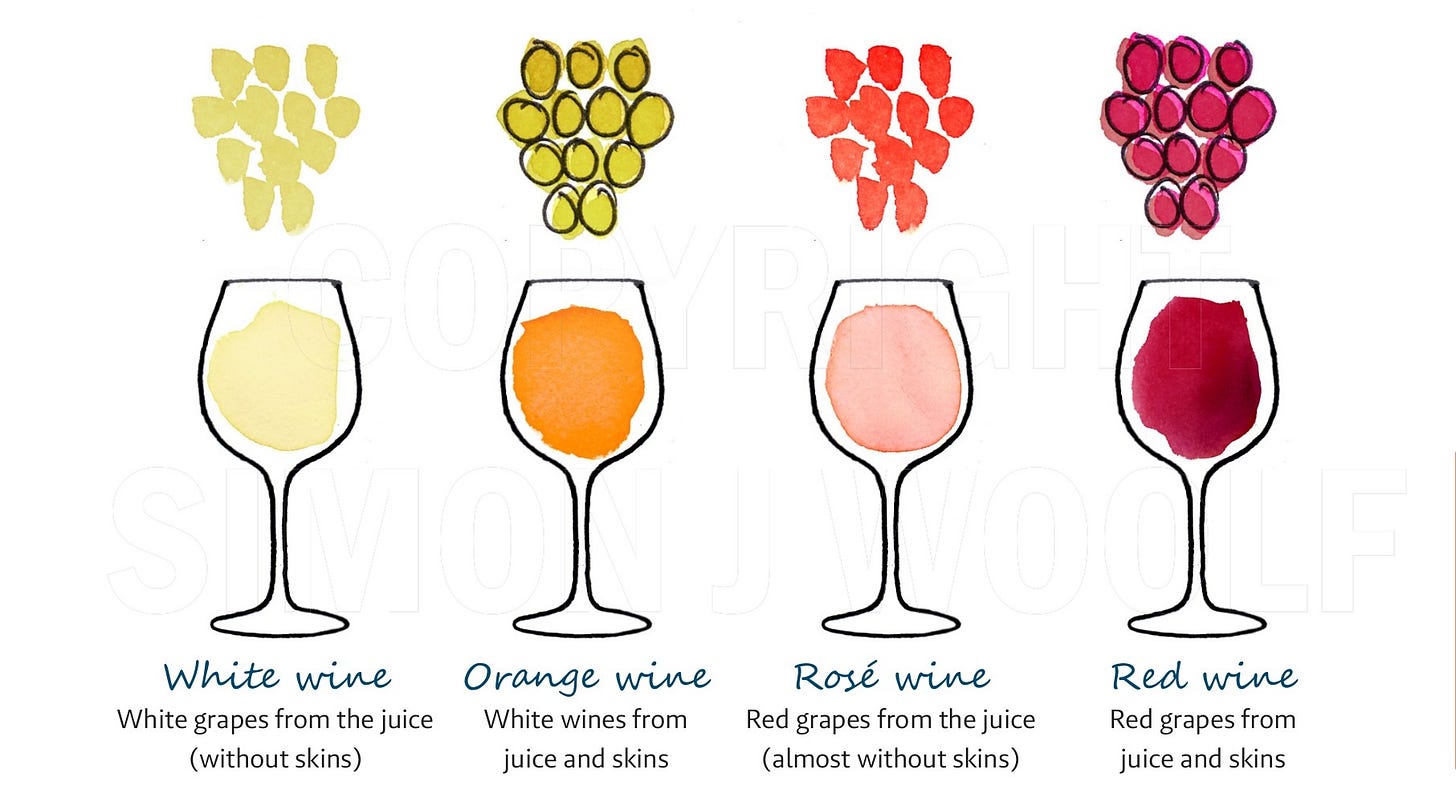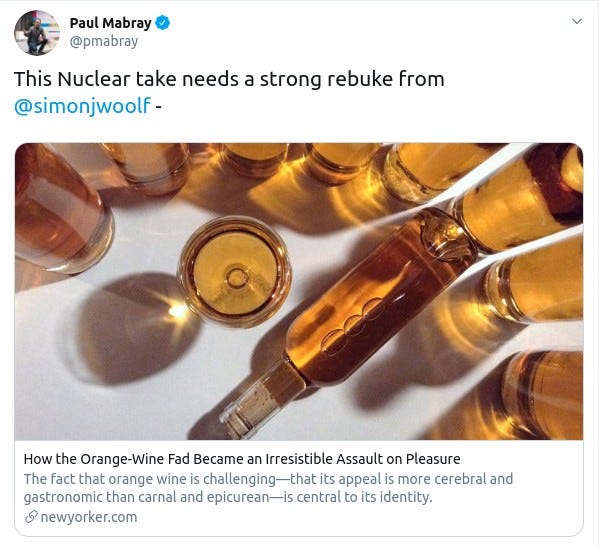Is orange wine really an 'assault on pleasure'?
Simon takes Troy Patterson to task for asserting that orange wines are an assault on pleasure.
I resisted writing this for a whole week. As the author of a book on orange wine, my twitter timeline was bound to start filing up when The New Yorker published a rant taking my favourite wine style to the cleaners. But despite many provocations, I took the advice of a colleague - effectively, don't feed the trolls.
The piece wasn't written by a wine critic, but by seasoned fashion, film and lifestyle journalist Troy Patterson. It has prompted a huge amount of discussion and a parry of counter-attacks in august publications such as the San Francisco Chronicle and Grub Street. I can resist no longer (sorry Damien), I am compelled to bellow into this cramped echo chamber and add my $0.02 (For my European readers, that's €0.018 at the time of writing).
So what exactly is the problem with Patterson's piece? As a colleague argued when I tried to trash it, it's eloquently written, and clearly researched and fact-checked. Well, yes and no.
The issues start with the headline (which admittedly may not have been written by Patterson himself). Orange wine is yet again dispatched as a "fad". Never mind that this has been the default method to make wine from white grapes for over 8,000 years in the Caucasus, and certainly for many centuries all around the Adriatic. Slagging off orange wine is the fad, actually. Not the beverage itself. And Patterson is about a decade late to that party.
Just a couple of paragraphs in, and we're flailing around in the familiar quicksands of natural wine and orange wine conflation: "orange wine has been becoming a thing—a trend, a movement, a totem of correct taste", or "The intrinsic emphasis on abstruse methods of production and challenging nuances of terroir suits going fashions for the sustainable, the 'authentic.'"
Let's be clear: 'orange wine' describes a technique, that of making a wine from white grapes where the skins are included in the fermentation. 'Natural wine' on the other hand - what Patterson is really getting his teeth into here - is an all-encompassing philosophy of making wine with the minimum possible intervention, in both vineyard and cellar.

Enough of the factoidal nit-picking. The biggest issue I take with Patterson's rant is that it feels puerile and embittered. It reads a bit like natural wine hating Jay Rayner channelled through supercilious Frasier Crane. As he repeatedly bemoans that orange wines are too acerbic, austere instead of pleasurable, his argument is essentially a redux of: "I tried it and I didn't like it. So it must be bad" - rather like a child who tastes coffee or beer for the first time, spits it out and proclaims it disgusting. Patterson implies that he doesn't want challenges or new experiences when it comes to beverages - which surely isn't ideal for a critic. Does he really believe everything that wine has to offer can be understood in just a few sips? Some styles take more time to reveal their magic.
Furthermore, his argument makes little sense if it is extrapolated - Tannins? Bad. Acidity? Bad. Unfamiliar flavours and aromas? Bad. What if he'd picked on young Barolo for being an assault on pleasure? It's also often brutally tannic and high in acid, needing time and patience before the best bottles are ready. No-one would have taken this seriously, because it pertains to an established tier of fine wine's hierarchy. But orange wine is the perennial fall guy, even after a decade or more of suffering similar putdowns and despite making extraordinary inroads into the wine world, appearing on restaurant and wine bar lists the world over, being produced by thousands of winemakers in over 30 countries worldwide and even getting a mention in the latest syllabus for the Wine & Spirits Education Trust.
And it should be said - the exponential growth in the number of orange wines produced, bought and sold worldwide has occurred because people enjoy drinking the stuff. Beard stroking hipsters in New York would not have achieved this on their own.
There are plenty of venerable wine styles that are harder to understand - more of an acquired taste, a niche pleasure. Step forward vin jaune, dry sherry, off-dry Riesling, Colares Ramisco, All have their roots in tradition, their audiences and their passionate fans. All provide drinking pleasure for those that know and love them.

Patterson implies that no-one would drink orange wines for enjoyment's sake - but rather just to score hipster points ("the pain inflicted by the flavors of some extreme beverages is the whole point of them"). He couldn't be more wrong. I am not alone in deriving pleasure and stimulation from orange wines and natural wines of all hues and weights. I also genuinely enjoy kombucha and sour beers - and I drink them at home, even without posting them on Instagram. Sizable communities of wine and beer drinkers worldwide share my passion and my preferences.
As the diagram above suggests, orange wine represents 25% of the possibilities in wine. The variety of flavours, textures and characters are every bit as broad as those for white or red wine (I hesitate to claim the same for rosé, even if it is theoretically true). Orange wines can be light and aromatic, full bodied and fruit driven, tannic and austere - and all points in between. Patterson even alludes to this mid-way through, but still goes in for the kill. Perhaps his editor was baying for clickbait that day?
The damning of an entire universe of wines as "an assault on pleasure" is no more or less ridiculous than saying "white wines are acid bombs with no depth or complexity" or "red wines are overbearing, heavyweight and tannic". It serves no purpose other than erecting a straw man, and waiting to see if anyone has the guts to knock it down. Would Patterson have played bully boy with a more established wine style? Almost certainly not. Orange wine is an obvious and easy target. Only the die-hards (guilty as charged) will fight back.
Patterson is the winner, of course. His trashing of this wonderful wine style was probably read by upwards of half a million people. My response will be read by a few hundred at best. But at least I got this off my chest.


